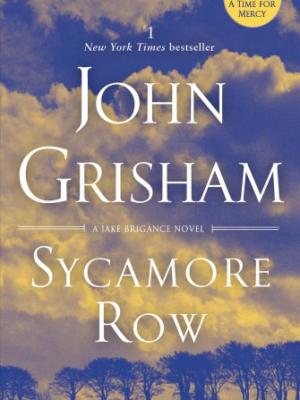
If you have read and enjoyed John Grisham’s first novel A Time to Kill, I believe you will enjoy Sycamore Row as well. If by chance you picked this up but haven’t read A Time to Kill, I would encourage you to put this to the side and read the previous novel first. Although I have not read all of Grisham’s novels, I have read many, and I consider this among his best.
Although the novel itself was written more than 25 years after A Time to Kill was published, the story takes place just three years after its conclusion and is set in the same town of Clanton, Mississippi. Jake Brigance and his family still haven’t fully recovered from the effects of the Hailey trial. Yet once again, he finds himself involved in a deeply controversial trial with racial prejudice and greed at its core.
Seth Hubbard is an old man, rich, twice divorced, estranged from his adult children and dying of cancer. He doesn’t trust lawyers, but before hanging himself from a sycamore tree deep in the woods of his large farm, he writes a concise hand-written note to Jake with an enclosed hand-written last will and testament that revokes a previous will drafted and signed by him a year before. That will left the bulk of his estate to his children. The new version leaves nearly all of his estate to his black maid and end of life caregiver and nothing for his children or ex-wives.
Although Hubbard and Jake never met, he was impressed with the courage and honesty that Jake displayed in defending Carl Lee Hailey and asks him to defend this new will from the anticipated challenges of his adult children, their children, his two ex-wives and their team of slick, greedy and at times ethically-challenged big city lawyers. A jury trial ensues, and this is where Grisham’s skills excel. He clearly understands the ins and outs of the American judicial system, how the legal community thinks and acts, courtroom procedures and the racial nuances and prejudices of the rural south. The trial takes many twists and turns but the over-riding question in the minds of all remains, why would an uncommonly wealthy white man leave most of his fortune to a black maid whom he had known only a few years, totally neglecting his family in the process?
As the contentious legal battle over the will continues Jake finds himself in a race against time to solve that singular mystery on which his case and the dying wishes of his client depend. Those many twists and turns, false leads and misleading paths are all the result of a deeply hidden past. When the truth of that past is uncovered the rest of the story quickly unfolds. We discover the sycamore tree that Hubbard hanged himself from at the beginning of the story was carefully selected. Although he could not undo the past or how it shaped his present, at the end he chose to make a different future.
I found this to be a compelling mystery filled with themes of guilt, shame, and injustice but ultimately it is also a story of redemption.
Written by John G., Tech Center